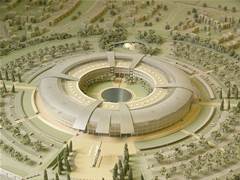The arms race of old has entered the cyberworld and nations are pushing hard to source the best security engineers to dominate the new battleground.
But network-centric conflict was still unfamiliar territory for many nations despite its involvement in military conflict for decades.
Dr Tobias Feaken, research fellow at British independent think tank the Royal United Services Institute, said nations such as Britain and Australia were among those seeking to fill seats in defensive, offensive and intelligence positions.
|
Britain's electronic intelligence agency
|
“They are trying to find out what talent exists and have commenced big recruitment drives,” Feaken said in a phone interview ahead of the Cyber War conference in Canberra.
“The US is bringing in 1000 plus people into its cyber security divisions and China and South Korea have ramped up recruitment. It is an arms race.”
Feakin, a renowned British counter-terrorism expert, sees network centric warfare as serious and big business.
He points out that the British Government tipped $1 billion ($AU650 million) over five years to 2015 into cyberwar coffers and anti-terrorism measures, while slashing public spending in other sectors.
Poignantly, the government planned to axe 42,000 military jobs over the same period.
Investments have been tougher to track in countries including Australia, which had launched a string of federal cyber defence and intelligence agencies that mirror those operating in allied nations.
Western nations have not yet laid claim to having fired cyber weapons but rhetoric is heavy with comminatory. Both Britain and the United States have flagged the use of offensive tactics should national assets be attacked.
“There is no doubt that [Britain] should have offensive capability,” Feaken said. “But there are questions about how it is used.”
One question is how cyberwar can be waged over infrastructure owned by the private sector.
To this end, British Prime Minister David Cameron had told prominent IT companies to “lay down arms and coordinate” to help build cyber capabilities, Feaken said.
Australia’s Attorney-General’s Department had spent the last two years identifying and training private sector organisations that were important to national defence.
Yet Feaken said Britain was only “just waking up” to serious network-related threats.
“The cyber domain is the greatest expressor of the individual to shape events since September 11. This is only recently being realised.”
For now, allied nations were focused on building information sharing arrangements. Feaken said Britain and Australia had historically perceived national threats similarly yet differed in how they were addressed.







.png&h=142&w=230&c=1&s=1)
_(21).jpg&h=142&w=230&c=1&s=1)





.jpg&w=100&c=1&s=0)











